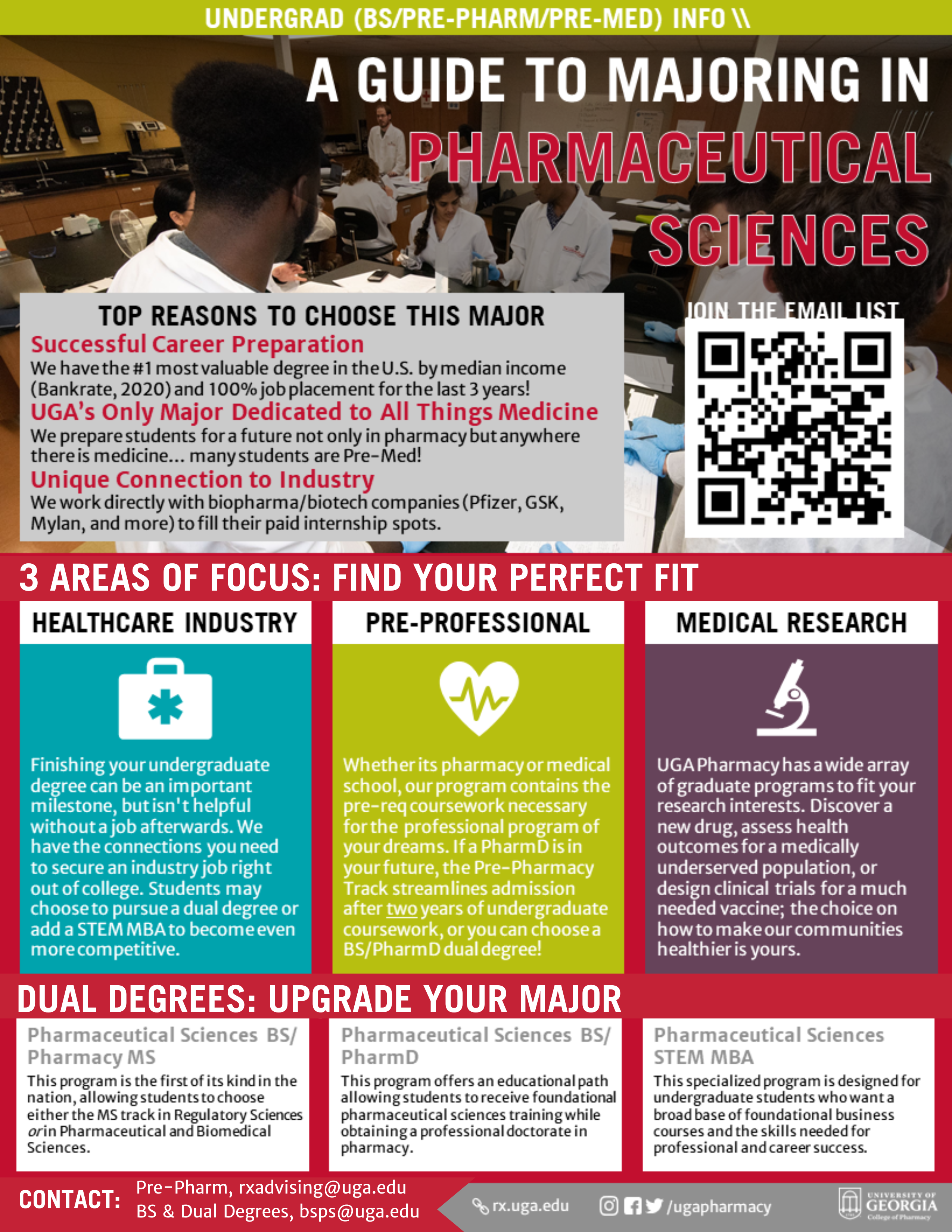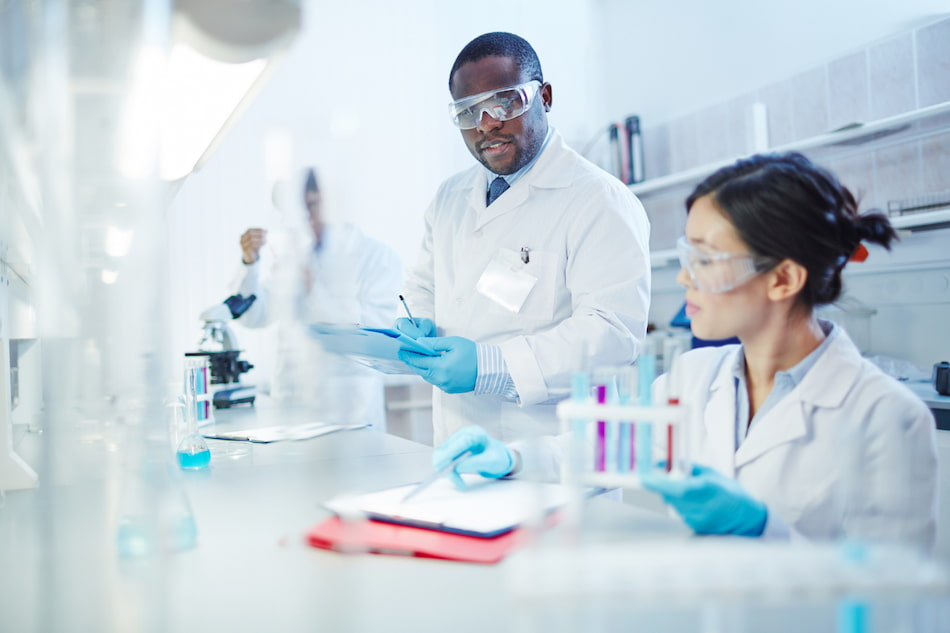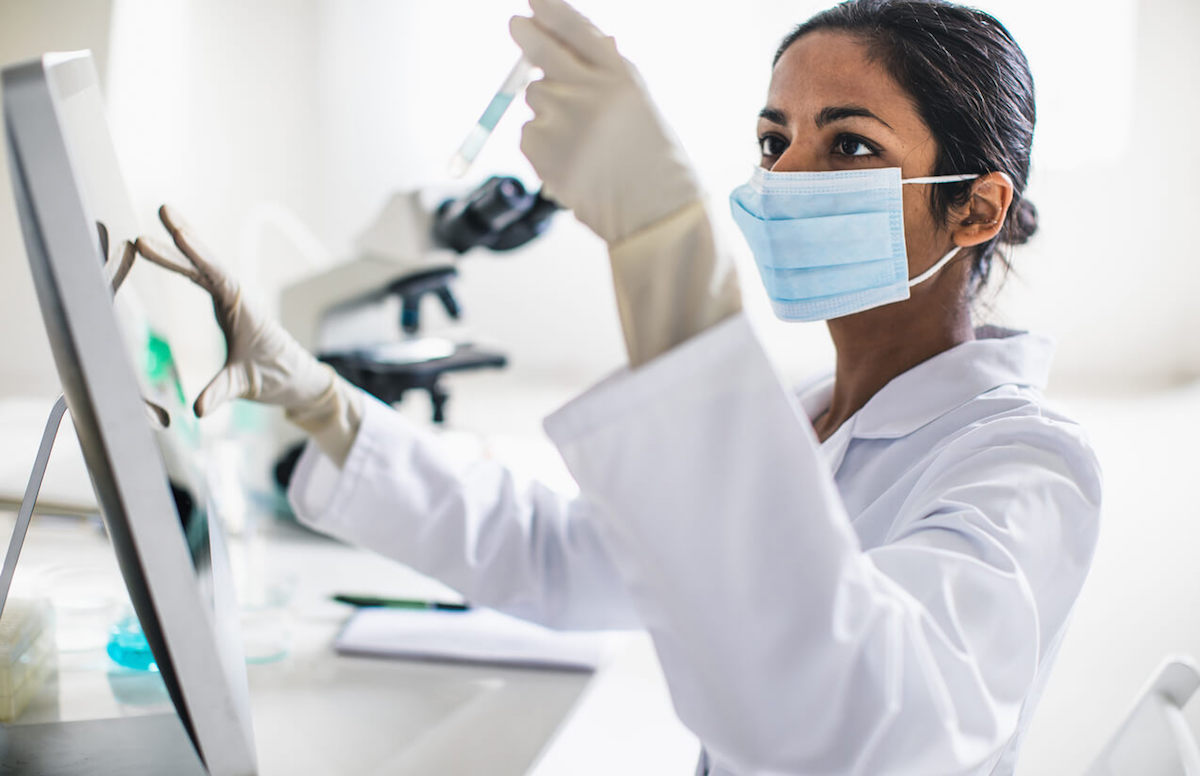To become a pharmaceutical scientist, you need to obtain a bachelor’s degree in pharmaceutical sciences or a related field, followed by a master’s degree and/or PhD in pharmaceutical sciences.

Credit: rx.uga.edu
Heading 1: Introduction to Pharmaceutical Science
| Introduction to Pharmaceutical Science |
Pharmaceutical science is an exciting and rapidly growing field that plays a crucial role in the development and discovery of new drugs. If you have a passion for science and a desire to make a positive impact on people’s lives, a career in pharmaceutical science may be the perfect choice for you. In this blog post, we will delve into the world of pharmaceutical science, exploring what it entails, its importance, and how you can become a pharmaceutical scientist. Let’s get started!
Subheading 1.1: What is Pharmaceutical Science?
Pharmaceutical science involves the study of drug formulation, development, and delivery to patients. It encompasses a wide range of disciplines, including chemistry, biology, pharmacology, and pharmaceutical technology. Pharmaceutical scientists are responsible for creating and improving medications, ensuring their safety and efficacy, and developing innovative drug delivery systems. They work closely with other healthcare professionals and regulatory agencies to ensure that drugs meet stringent quality and regulatory standards.
Subheading 1.2: Importance of Pharmaceutical Science
Pharmaceutical science is of paramount importance to the healthcare industry and society as a whole. It plays a crucial role in improving and saving lives by developing and providing access to effective and safe medications. Here are some key reasons why pharmaceutical science is essential:
- Innovation and Advancements: Pharmaceutical science drives innovation and technological advancements in the field of medicine. It enables the discovery of new drugs, the development of novel drug delivery systems, and the improvement of existing medications.
- Quality and Safety: Pharmaceutical scientists ensure that medications meet rigorous quality and safety standards. They conduct extensive research to understand the effects of drugs on the human body, minimizing the risk of adverse reactions and improving patient outcomes.
- Disease Prevention and Management: The field of pharmaceutical science plays a critical role in disease prevention and management. Through the development of vaccines and new treatment options, pharmaceutical scientists contribute to reducing the incidence and severity of diseases.
- Drug Accessibility: Pharmaceutical science focuses on making medications accessible to all individuals, regardless of their geographical location or socioeconomic status. It aims to develop cost-effective drugs and ensure that they reach those in need.
- Patient Care and Well-being: Pharmaceutical scientists work hand in hand with healthcare professionals to provide optimal patient care. They collaborate on developing personalized treatment plans, optimizing drug therapies, and ensuring that patients receive the most effective medications for their specific conditions.
The importance of pharmaceutical science cannot be overstated. It is a field that combines scientific expertise with a passion for improving human health, making it an incredibly rewarding career choice.

Credit: graduate.northeastern.edu
Heading 2: Educational Requirements to Become a Pharmaceutical Scientist
In order to pursue a successful career as a pharmaceutical scientist, it is crucial to have the right educational qualifications. Below, we will explore the different educational paths that can lead you to this fulfilling profession.
Bachelor’s Degree in Pharmaceutical Science
A Bachelor’s degree in Pharmaceutical Science is the first step towards becoming a pharmaceutical scientist. This degree program typically takes four years to complete and provides a solid foundation in the fundamental concepts of pharmaceutical science. During your undergraduate studies, you will gain knowledge in areas such as chemistry, biochemistry, pharmacology, and drug development.
Additionally, you will have the opportunity to engage in laboratory experiments and practical applications, allowing you to develop essential research and analysis skills. By the end of the program, you will have a comprehensive understanding of the pharmaceutical industry and be ready to pursue further education or entry-level positions in the field.
Master’s Degree in Pharmaceutical Science
A Master’s degree in Pharmaceutical Science offers a deeper level of specialization and advanced knowledge in this discipline. This program generally takes two years to complete and is designed for individuals who want to enhance their expertise in specific areas of pharmaceutical research and development.
During your Master’s studies, you will delve into advanced topics such as medicinal chemistry, drug formulation and delivery, clinical research, and regulatory affairs. This degree will equip you with the necessary skills to carry out complex experiments, analyze data, and effectively communicate your findings.
Ph.d. in Pharmaceutical Science
A Ph.D. in Pharmaceutical Science is the highest level of education you can pursue in this field. This program typically takes around five to six years to complete and emphasizes original research and contributions to the field.
During your Ph.D. studies, you will undertake rigorous research projects, collaborate with industry professionals, and contribute to scientific journals. This advanced degree will enable you to specialize in a specific area of pharmaceutical science and make significant advancements in drug discovery, formulation, or clinical research.
As a pharmaceutical scientist with a Ph.D., you will have the qualifications necessary to pursue senior-level positions in research institutions, pharmaceutical companies, or regulatory agencies. Your expertise will be highly valued in the industry, and you will have the opportunity to contribute to groundbreaking advancements in healthcare.
Heading 3: Gaining Practical Experience in Pharmaceutical Science
Gain practical experience in pharmaceutical science to become a successful pharmaceutical scientist. Learn through hands-on training, internships, and research projects to develop the necessary skills for a rewarding career in the industry.
Subheading 3.1: Internships and Co-op Programs
Participating in internships and co-op programs is an excellent way to gain practical experience in the field of pharmaceutical science. These programs provide students and recent graduates with the opportunity to work alongside experienced professionals in real-world settings. By actively engaging in hands-on learning, you can develop essential skills, expand your knowledge, and build a strong foundation for your future career.
Subheading 3.2: Research Opportunities
Seeking out research opportunities is another valuable path to gain practical experience in pharmaceutical science. Universities, research institutions, and pharmaceutical companies often offer research positions to students and individuals interested in exploring the field further. As a research assistant, you can collaborate on projects, conduct experiments, analyze data, and contribute to the development of new drugs and treatments. Such experiences not only enhance your technical skills but also allow you to stay updated with the latest advancements in the field.
Subheading 3.3: Volunteering in the Pharmaceutical Field
Volunteering in the pharmaceutical field is a fulfilling way to gain practical experience while making a positive impact. Many nonprofits, healthcare organizations, and clinical trials rely on the assistance of volunteers to support their operations. By offering your time and expertise, you can actively contribute to various pharmaceutical initiatives. Volunteering allows you to work alongside professionals, interact with patients, and gain insights into the inner workings of the industry. This experience can serve as a valuable addition to your resume and demonstrate your commitment to the field.

Credit: graduate.northeastern.edu
Heading 4: Building a Successful Career in Pharmaceutical Science
Building a successful career in pharmaceutical science requires dedication, ongoing learning, and staying updated with the latest industry trends and innovations. To excel in this field, professionals need to focus on networking, professional development, obtaining professional certifications, and staying updated with industry trends.
Subheading 4.1: Networking and Professional Development
Networking plays a crucial role in the pharmaceutical science industry. By connecting with peers, industry professionals, and potential employers, you can gain valuable insights into the field and discover new opportunities. Attending industry conferences, workshops, and seminars can help you expand your professional network and stay updated on the latest advancements. Additionally, joining professional organizations such as the International Society for Pharmaceutical Engineering (ISPE) or the American Association of Pharmaceutical Scientists (AAPS) can provide you with access to resources, mentorship programs, and networking events.
Subheading 4.2: Obtaining Professional Certifications
Obtaining professional certifications in pharmaceutical science can enhance your credentials and showcase your expertise in specific areas. Certifications such as the Certified Pharmaceutical Industry Professional (CPIP) and the Certified Clinical Research Professional (CCRP) demonstrate your commitment to ongoing learning and professional development. These certifications not only increase your chances of career advancement but also validate your knowledge and skills to potential employers. Research the certifications relevant to your area of interest and assess their requirements to determine the most appropriate ones to pursue.
Subheading 4.3: Staying Updated with Industry Trends and Innovations
The pharmaceutical science field is constantly evolving. To stay ahead of the curve, it’s crucial to stay informed about the latest industry trends and innovations. Regularly reading industry publications, such as Pharmaceutical Technology or Drug Discovery Today, can help you stay updated with the latest research, breakthroughs, and regulatory changes. Subscribe to newsletters and follow reputable pharmaceutical science blogs to receive updates directly in your inbox. By staying informed, you can anticipate industry shifts, identify new opportunities, and adapt your skills and knowledge accordingly.
- Stay informed about the latest industry trends.
- Read industry publications and subscribe to newsletters.
- Follow reputable pharmaceutical science blogs.
- Anticipate industry shifts and adapt your skills accordingly.
To sum up, networking, professional development, obtaining certifications, and staying updated with industry trends are vital for building a successful career in pharmaceutical science. By actively engaging in these activities, you can enhance your knowledge, broaden your professional network, and increase your chances of career advancement.
Conclusion
Becoming a pharmaceutical scientist requires a passion for science, strong analytical skills, and continuous learning. By earning a relevant degree, gaining practical experience, and staying updated with the latest advancements, you can pave your way towards a successful career in this field.
Embrace opportunities to collaborate, stay curious, and never stop expanding your knowledge. With dedication and perseverance, you can make your mark in the pharmaceutical industry and contribute towards improving global health.
